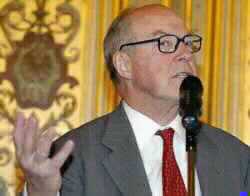The U.S. government has begun monitoring Iraqis living in the United States, hoping to uncover potential terrorist threats in the event that war breaks out with Iraq, Bush administration and congressional sources told Reuters. Iraq's Deputy Prime Minister Tareq Aziz said Baghdad welcomed chief U.N. weapons inspector Hans Blix and that the results of the inspections would expose as lies the U.S. charges that Iraq maintained weapons of mass destruction.
"We are going to expose the truth. The Americans are worried because the truth is going to be exposed and their lies are going to be exposed," Aziz told reporters in Baghdad in one of the first personal statements by the Iraqi leadership since President Saddam Hussein agreed on Wednesday to new inspections.
His remarks echoed an earlier message from Saddam to the Iraqi parliament saying U.N. inspections would prove Iraq was devoid of weapons of mass destruction and allow it to work on ending 12-year-old U.N. sanctions crippling his country.
Iraq's decision to allow the return of the arms inspectors after a four-year absence gives it a chance to dispose of the alleged weapons of mass destruction, prove they do not exist or face possible U.S. military action.
"The Americans are always suspicious because they have goals when they speak about weapons of mass destruction. They want an excuse to launch aggression," Aziz said.
BLIX TO ARRIVE IN IRAQ ON MONDAY
Blix and Mohamed El-Baradei, director of the Vienna-based International Atomic Energy Agency, are scheduled to arrive in Baghdad on Monday to begin the investigation, with inspections set to start on Nov. 27.
Blix said on Saturday he could not rule out there might be spies in his team due to resume work in Iraq, but any intelligence agents would be ordered off the group.
In Paris on his way to Cyprus and Baghdad, Blix said it was important that the team avoid the charges of bias that undermined the work of the last inspectors who worked in Iraq between 1992 and 1998. He warned Iraqi authorities that any delay in allowing inspectors access to sites would be very serious, but did not say whether it would violate U.N. resolution 1441.
Iraq has accused some previous U.N. arms inspectors of being spies working for the United States, but Blix said he could not be sure that the team of inspectors, due to resume work in Iraq on Nov. 27, would be free of undercover agents.
He stressed that the group was made up of 45 different nationalities in an effort to ensure it remained impartial.
"People have asked me: 'Can you be absolutely sure we will have no spies in any of the member states?' and I said no, I don't think either the KGB or the CIA can give that absolute assurance," Blix told a news conference.
"All I can say is that if I see someone having two hats, then I would ask them to walk out," he added. Blix said he expected to have 100 inspectors in Iraq by the end of the year.
He acknowledged that charges of spying had undermined the work of the previous U.N. inspection regime.
Aziz is likely to meet Blix and El-Baradei in Baghdad next week. Iraqi Foreign Minister Naji Sabri and Saddam's adviser, Amir al-Saadi, are also expected to meet them.
U.S. TRACKS IRAQIS IN AMERICA
In Washington, President Bush had tough words for Saddam, while sources detailed an intelligence operation in which U.S. authorities are tracking hundreds and possibly thousands of Iraqi citizens who work and study in the United States and who may be sympathizers of the Iraqi president.
If Bush takes military action against Iraq, the intelligence operation could be expanded -- through closer monitoring and possible detentions -- with the goal of thwarting terrorist attacks against Americans, sources said.
Bush expressed skepticism that Iraq would adhere to the U.N. resolution granting inspectors unfettered access to sites across Iraq.
"America and the world are now watching Saddam Hussein closely. Any act of defiance or delay will indicate that he is taking the path of deception once again, and this time the consequences would be severe," Bush said in a radio address.
Underlining the severity of the consequences, one of the nations which fought hard to give Iraq a chance to avoid attack, agreed that the U.N. resolution which Baghdad has accepted would allow use of force if there is a whiff of obstruction.
Russian Foreign Minister Igor Ivanov acknowledged that force could be used against Iraq if it failed to abide by the new U.N. resolution, but stressed that only the world body could decide when that time might be."
Resolution 1441 ... allows for the full use of force, in the sense that you can use force if the resolution is violated.
So, theoretically that (force) is an option," he said in an interview on state Rossiya television.
Iraq, under Security Council resolution 1441 adopted on Nov. 8, has to give a "full, accurate and complete" declaration of all its programs and material that can be used to develop chemical, biological and nuclear arms, and ballistic missiles.
The declaration is due on Dec. 8. Iraq has said repeatedly it has no weapons of mass destruction. But Blix said Iraq often had changed its position in the past and now had time to examine archives, stores and stocks to determine whether there is something there
PHOTO CAPTION
Executive chairman of the U.N. Inspection Commission Hans Blix adresses the media during a press conference in Paris on December 16, 2002. Blix said that inspections in Iraq will begin on November 27, 2002 and warned Iraqi leader Saddam Hussein to disclose all his weapons of mass destruction. Photo by Philippe Wojazer/Reuters
- Author:
& News Agencies - Section:
WORLD HEADLINES


 Home
Home Discover Islam
Discover Islam Quran Recitations
Quran Recitations Lectures
Lectures
 Fatwa
Fatwa Articles
Articles Fiqh
Fiqh E-Books
E-Books Boys & Girls
Boys & Girls  Hajj Rulings
Hajj Rulings Hajj Fatwas
Hajj Fatwas














